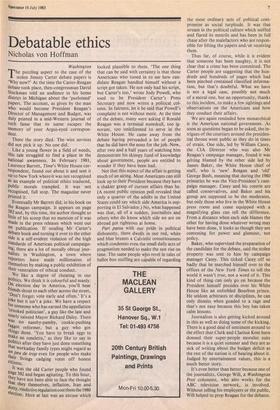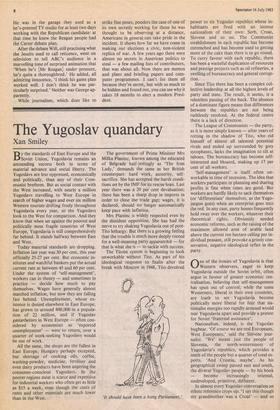Debatable ethics
Nicholas von Hoffman
The puzzling aspect to the case of the stolen Jimmy Carter debate papers is 'Why now?' At the time the Carter-Reagan debate took place, then-congressman David Stockman told an audience in his home district in Michigan about the 'purloined' Papers. The account, as given by the man who would become President Reagan's Director of Management and Budget, was duly printed in a mid-Western journal of such fame that its name escapes the memory of your Argus-eyed correspon- dent.
There the story died. The wire services did not pick it up. No one did.
Like a young flower in a field of weeds, this tale struggled to find a place in the national awareness. In February 1981, Laurence Barrett, Time's White House cor- respondent, found out about it and sent it up to New York where-it was not recognised as an example of political ethics traduced, Public morals trampled. It was not recognised, full stop. The magazine never printed it.
Eventually Mr Barrett did, in his book on the Reagan campaign. It appears on page 3,82 and, by this time, the author thought so little of his scoop that no mention of it was Made in the press releases which went out On publication. If stealing Mr Carter's debate book and turning it over to the other Side is a self-evident violation of the high taridards of American political campaign- ing, there are a lot of morally obtuse jour- nalists in Washington, a town where reporters have made millionaires of themselves by making a public exhibition of their veneration of ethical conduct. We like a degree of cheating in our „Pnlitics. We think it is colourful and manly. u.n election day in America, you'll hear r:riends shout to each other across the street, Don't forget: vote early and often.' It's a Joke but it isn't a joke. We have a respect f,or someone who has earned the appellation crooked politician', a guy like the late and nearly sainted Mayor Richard Daley. There Wc as no namby-pamby, cookie-pushing 148/got reformer, but a guy who got things done. 'You have to break eggs to Make an omelette,' as they like to say in Politics after they have just done something that workaday family types might regard as peu de trop even for people who make
eir livings cadging votes off honest
citizens It was the old Carter people who found Page 382 and began agitating. To this hour, rheY have not been able to face the thought that they themselves, inflation, Iran and cl'intY, vindictive regulation cost them the 1980 election. Here at last was an excuse which
looked plausible to them. 'The one thing that can be said with certainty is that those Americans who tuned in to see how can- didate Reagan handled himself without a script got taken. He not only had his script, but Carter's too,' wrote Jody Powell, who used to be President Carter's Press Secretary and now writes a political col- umn. In fairness, let it be said that Powell's complaint is not without merit. At the time of the debate, many were asking if Ronald Reagan was a terminal numskull, too ig- norant, too uninformed to serve in the White House. He came away from the debate having persuaded a lot of people that he did have the nous for the job. Now, after two and a half years of watching him demonstrate his skimpy fund of knowledge about government, people are entitled to wonder if they have been had.
Not that this aspect of the affair is getting much of an airing. Most Americans can still look up to their President because they have a shakier grasp of current affairs than he. (A recent public opinion poll revealed that only a quarter of the adults in the United States could say which side America is sup- porting in El Salvador.) No, what happened was that, all of a sudden, journalists and others who do know which side we are on abroad got righteous at home.
Pan i passu with our pride in political dishonesty, there dwells in our red, white and blue breasts a Calvinist censoriousness which condemns even the small daily acts of pragmatism needed to make the sun rise on time. The same people who revel in tales of ballot box stuffing are capable of regarding
the most ordinary acts of political com- promise as social turpitude. It was that stream in the political culture which sniffed and flared its nostrils and has been in full chase after the malefactors who are respon- sible for lifting the papers and/or receiving them.
Thus far, of course, while it is evident that someone has been naughty, it is not clear that a crime has been committed. The Carter people are suggesting that the hun- dreds and hundreds of pages which had been pinched contained classified informa- tion, but that's doubtful. What we have is not a legal case, possibly not much of a moral one, but an opportunity, thanks to this incident, to make a few sightings and observations on the Americans and how they conduct their affairs.
We are again reminded how monarchical is the American national government. As soon as questions began to be asked, the in- trigues of the courtiers around the presiden- tial throne went public as they do in times of strain. One side, led by William Casey, the CIA Director who was also Mr Reagan's campaign manager, found it was getting blamed by the other side led by James Baker, the White House chief of staff, who is 'new' Reagan and 'old' George Bush, meaning that during the 1980 primaries he was the Vice-President's cam- paign manager. Casey and his coterie are called conservatives, and Baker and his group are supposed to be the moderates, but only those who live in the White House press room and come equipped with a magnifying glass can tell the difference. From a distance when each side blames the other for having done whatever wrong may have been done, it looks as though they are contesting for power and glamour, not policy.
Baker, who supervised the preparation of the candidate for the debate, said the stolen property was sent to him by campaign manager Casey. This ticked Casey off so badly that he marched himself over to the offices of the New York Times to tell the world it wasn't true, not a word of it. This kind of thing can only go on because the President himself presides over his White House like an enfeebled Bourbon prince. He seldom arbitrates or disciplines, he can only dismiss when goaded to a rage and that's not easy because this boy has taken calm lessons.
Journalism is also getting kicked around in this as well as doing some of the kicking. There is a good deal of sentiment around to the effect that Clark and Clarissa Kent have donned their super-people moralist suits because it is a quiet summer and they are as sick of writing about the budget deficit as the rest of the nation is of hearing about it. Judged by entertainment values, this is a much better story.
It's even better than better because one of the journalists, George Will, a Washington Post columnist, who also works for the ABC television network, is involved. Without telling his employers or the public, Will helped to prep Reagan for the debates.
He was in the garage they used as a let's-pretend TV studio for at least two days working with the Republican candidate: at that time he knew the Reagan people had the Carter debate plan.
After the debate Will, still practising what , the Jesuits used to call reticence, went on• television to tell ABC's audience in a marvelling tone of surprised animation that 'When he's [Mr Reagan] under pressure, he's quite a thoroughbred.' He added, all admiring innocence, 'I think his game plan worked well. I don't think he was par- ticularly surprised.' Neither was George ap- parently.
While journalism, which does like to
strike fine poses, ponders the case of one of its own secretly working for those he was thought to be observing at a distance, Americans in general can take pride in the incident. It shows how far we have come in making our elections a civic, non-violent replica of war. A few years ago there were almost no secrets in American politics to steal — a few mailing lists of contributors, that was about all. Now there are memos and plans and briefing papers and com- puter programmes. I can't list them all because they're secret, but with so much to be hidden and found out, you can see why it takes 18 months to elect a modern Presi- dent.







































 Previous page
Previous page